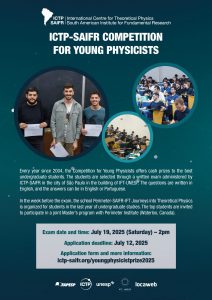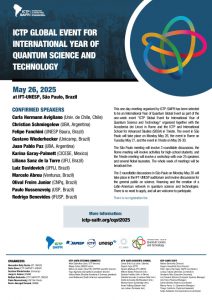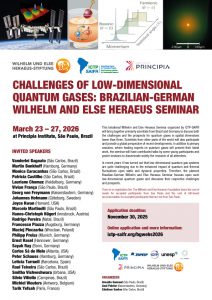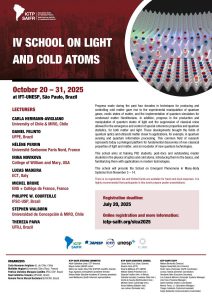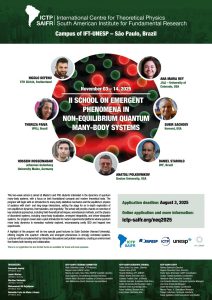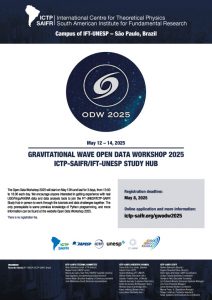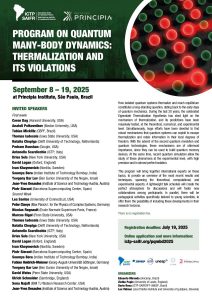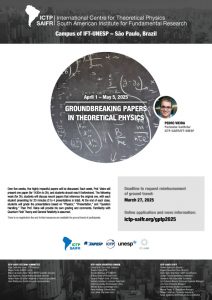Search Results
Minicourse on Black Hole Superradiance
May 15 – 22, 2025
ICTP-SAIFR, São Paulo, Brazil
Home
Gravitational and
There is no registration fee.
Speakers:
- Nils Siemonsen (Princeton University, USA)
- Maxence Corman (Max Planck Institute, Germany)
Organizer:
- Riccardo Sturani (ICTP-SAIFR/IFT-UNESP, Brazil)
Program
All meetings will be held in Room 2 on the third floor.
Thursday May 15:
- (16:00 – 17:40) 1st class, Nils Siemonsen. – Video
Monday May 19:
- (14:15 – 15:15) Seminar by Maxence Corman: Nonlinear dynamics of compact object mergers beyond General Relativity. – Video
- (16:00 – 17:40) 2nd class, Nils Siemonsen. – Video
- (16:00 – 17:00) Seminar by Nils Siemonsen: Searching for New Physics with Gravitational Waves. – Video
Photos
Additional Information
Attention! Some participants in ICTP-SAIFR activities have received email from fake travel agencies asking for credit card information. All communication with participants will be made by ICTP-SAIFR staff using an e-mail “@ictp-saifr.org”. We will not send any mailings about accommodation that require a credit card number or any sort of deposit. Also, if you are staying at Hotel Intercity the Universe Paulista, please confirm with the Uber/Taxi driver that the hotel is located at Rua Pamplona 83 in Bela Vista (and not in Jardim Etelvina).
BOARDING PASS: All participants, whose travel has been provided or will be reimbursed by ICTP-SAIFR, should bring the boarding pass upon registration. The return boarding pass (PDF, if online check-in, scan or picture, if physical) should be sent to secretary@ictp-saifr.org by e-mail.
Visa information: Nationals from several countries in Latin America and Europe are exempt from tourist visa. Nationals from Australia, Canada and USA are required to apply for a tourist visa.
Accommodation: Participants whose accommodations are provided by ICTP-SAIFR will stay at Hotel Intercity the Universe Paulista. Other hotel recommendations are available here.
Poster presentation: Participants who are presenting a poster MUST BRING A PRINTED BANNER . The banner size should be at most 1 m (width) x 1,5 m (length). We do not accept A4 or A3 paper.
Continue Reading |
Comments Off on
ICTP-SAIFR Competition for Young Physicists

Information
Every year since 2004, the Competition for Young Physicists offers cash prizes to the best undergraduate students. The students are selected through a written exam administered by ICTP-SAIFR in the city of São Paulo in the building of IFT-UNESP. The questions are written in English, and the answers can be in English or Portuguese.
Exam date in 2025: July 19, 2025 (Saturday), 14:00
Exam location: IFT-UNESP (4th floor auditorium)
Cash prizes: First place – 1000 reais, Second place – 800 reais, Third place – 600 reais, Fourth place – 400 reais, Fifth place – 200 reais.
In the week before the exam, the school Perimeter-SAIFR-IFT Journeys into Theoretical Physics is organized for students in the last year of undergraduate studies. The top students are invited to participate in a joint Master’s program with Perimeter Institute (Waterloo, Canada). More information on this school can be found at: https://journeys.ictp-saifr.org/
To participate, candidates need to register before July 12, 2025 by filling out the Registration Form on this webpage. Candidates approved for the Perimeter-SAIFR-IFT Journeys into Theoretical Physics school are automatically registered for the ICTP-SAIFR Competition for Young Physicists and do not need to fill out this form.
Announcement:
Registration Form
Registration deadline: July 12
Regulations
About the registration:
Candidates need to be enrolled in an undergraduate program in order to win a cash prize, but any student can take the exam.
Registration is done online using the link on this website and candidates need to fill out their name, birth date, identification number (RG or passport), year of undergraduate studies, institution.
About the exam:
The written exam will last 3 ½ hours, and have questions at the undergraduate level on Classical Mechanics, Quantum Mechanics, Statistical Mechanics/Thermodynamics, Electromagnetism, Special Relativity and Mathematical Physics. Only registered students carrying an identification document with photo can take the exam. During the exam, it is not allowed the use of notes, books, computers, calculators cellphones or internet.
Registration Form
Announcement:
Registration Form
Registration deadline: July 12
Exam date: July 19, 2025 (Saturday), 2pm
Exam location: IFT-UNESP (4th floor auditorium)
Winners & Previous Exams
Previous exams:
Winners:
Ganhadores do 2012 Prêmio IFT-ICTP para Jovens Físicos
Ganhadores do 2013 Prêmio IFT-ICTP para Jovens Físicos
Ganhadores do 2014 Prêmio IFT-ICTP para Jovens Físicos
Ganhadores do 2015 Prêmio IFT-ICTP para Jovens Físicos
Ganhadores do 2016 Prêmio IFT-ICTP para Jovens Físicos
Ganhadores do 2017 Prêmio IFT-ICTP para Jovens Físicos
Ganhadores das Bolsas 2018 ICTP-SAIFR para Jovens Físicos
Ganhadores das Bolsas 2019 ICTP-SAIFR para Jovens Físicos
Ganhadores das Bolsas 2022 ICTP-SAIFR para Jovens Físicos
Ganhadores do 2023 Prêmio SAIFR para Jovens Físicos
Ganhadores do 2024 Prêmio SAIFR para Jovens Físicos
Continue Reading |
Comments Off on
ICTP Global Event for International Year of Quantum Science and Technology

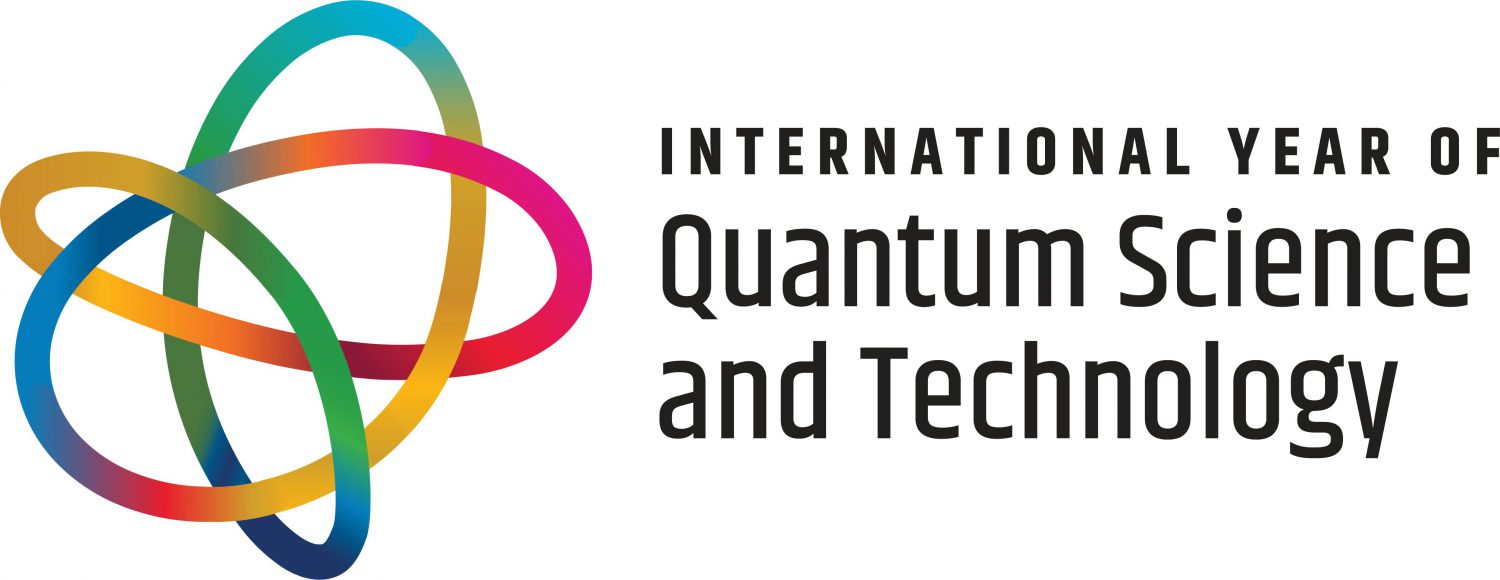
May 26, 2025
ICTP-SAIFR, São Paulo, Brazil
Zoom ID: 859 8983 6672 Password: quantum
Home
This one-day meeting organized by ICTP-SAIFR has been selected to be an International Year of Quantum Global Event as part of the one-week event “ICTP Global Event for International Year of Quantum Science and Technology” organized together with the Accademia dei Lincei in Rome and the ICTP and International School for Advanced Studies (SISSA) in Trieste. The event in São Paulo will take place on Monday May 26, the event in Rome on Tuesday May 27, and the event in Trieste on May 28-30.
The São Paulo meeting will involve 3 roundtable discussions, the Rome meeting will involve activities for high-school students, and the Trieste meeting will involve a workshop with over 25 speakers and several Nobel laureates. The program for the Trieste meeting is here and the whole week of meetings will be broadcast live. The Zoom links for the activities will be posted on this webpage.
The 3 roundtable discussions in São Paulo on Monday May 26 will take place in the IFT-UNESP auditorium and involve discussions for the general public on science, financing and the creation of a Latin-American network in quantum science and technologies. There is no need to apply, and all are welcome to participate.
There is no registration fee.
Confirmed Speakers:
- Carla Hermann Avigliano (Univ. de Chile, Chile)
- Christian Schmiegelow (Univ. de Buenos Aires, Argentina)
- Gustavo Wiederhecker (Unicamp, Brazil)
- Juan Pablo Paz (Univ. de Buenos Aires, Argentina)
- Karina Garay-Palmett (CICESE, Mexico)
- Liliana Sanz de la Torre (Univ. Fed. de Uberlândia, Brazil)
- Luiz Davidovich (Univ. Fed. de Rio de Janeiro, Brazil)
- Marcelo Abreu (Venturus, Brazil)
- Olival Freire Junior (CNPq, Brazil)
- Paulo Nussenzveig (USP, Brazil)
- Rodrigo Benevides (IFUSP, Brazil)
- Thiago Alegre (Unicamp, Brazil)
Organizers:
- Alexandre Reily Rocha (IFT-UNESP)
- Dario Rosa (ICTP-SAIFR/IFT-UNESP)
- Gustavo Wiederhecker (Unicamp)
- Jorge A. Seman (UNAM)
- Nathan Berkovits (ICTP-SAIFR/IFT-UNESP)
- Paulo Nussenzveig (USP São Paulo)
- Rocío Jáuregui Renaud (UNAM)
Announcement:
Program
Monday May 26
Photos
Additional Information
Attention! Some participants in ICTP-SAIFR activities have received email from fake travel agencies asking for credit card information. All communication with participants will be made by ICTP-SAIFR staff using an e-mail “@ictp-saifr.org”. We will not send any mailings about accommodation that require a credit card number or any sort of deposit. Also, if you are staying at Hotel Intercity the Universe Paulista, please confirm with the Uber/Taxi driver that the hotel is located at Rua Pamplona 83 in Bela Vista (and not in Jardim Etelvina).
BOARDING PASS: All participants, whose travel has been provided or will be reimbursed by ICTP-SAIFR, should bring the boarding pass upon registration. The return boarding pass (PDF, if online check-in, scan or picture, if physical) should be sent to secretary@ictp-saifr.org by e-mail.
Visa information: Nationals from several countries in Latin America and Europe are exempt from tourist visa. Nationals from Australia, Canada and USA are required to apply for a tourist visa.
Accommodation: Participants whose accommodations are provided by ICTP-SAIFR will stay at Hotel Intercity the Universe Paulista. Other hotel recommendations are available here.
Poster presentation: Participants who are presenting a poster MUST BRING A PRINTED BANNER . The banner size should be at most 1 m (width) x 1,5 m (length). We do not accept A4 or A3 paper.
Continue Reading |
Comments Off on
Challenges of Low-Dimensional Quantum Gases: Brazilian-German Wilhelm and Else Heraeus Seminar


March 23 – 27, 2026
ICTP-SAIFR, São Paulo, Brazil
Venue: Principia Institute
Home
This binational Wilhelm and Else Heraeus Seminar organized by ICTP-SAIFR will bring together primarily scientists from Brazil and Germany to discuss both the challenges and the prospects for quantum gases in spatial dimensions lower than three. Scientists from other parts of the world will also participate and provide a global perspective of recent developments. In addition to plenary sessions, where leading experts on quantum gases will present their latest work, the seminar will have contributed talks by some young participants and poster sessions to disseminate widely the research of all attendees.
In recent years it has turned out that low-dimensional quantum gas systems are quite challenging due to the enhanced impact of quantum and thermal fluctuations upon static and dynamic properties. Therefore, the planned Brazilian-German Wilhelm and Else Heraeus Seminar focuses upon such low-dimensional quantum gases and discusses their respective challenges and prospects. In particular we have in mind to highlight.
- two-dimensional quantum gas systems with properties, which do not exist in their three-dimensional
- counterparts as, for instance, the fractional quantum Hall effect or the Berezinskii-Kosterlitz-Thouless phase transition,
- quantum gases in a microgravity bubble trap in order to investigate how the differential geometry of a closed surface affects the system properties,
- photon Bose-Einstein condensates in dye-filled microcavities and semiconductor lasers with their potential technological applications,
- anyonic stastistics realized by bosonic or fermionic atoms in one-dimensional lattices in order to obtain a deeper understanding of the intriguing stastistical interaction, which is omnipresent in the quantum realm due to the indistingishability of identical quantum particles.
There is no registration fee. The Wilhelm and Else Heraeus-Foundation bears the cost of meals for accepted participants from Sao Paulo and the cost of full-board accommodation for accepted participants that are not from Sao Paulo.
Organizers:
Arnaldo Gammal (São Paulo, Brazil)
Axel Pelster (Kaiserslautern, Germany)
Ednilson Santos (São Carlos, Brazil)
Announcement:
Click HERE for online application
Application deadline: November 30, 2025
Invited Speakers
Invited speakers
- Vanderlei Bagnato (São Carlos, Brazil)
- Martin Bonkhoff (Hamburg, Germany)
- Monica Caracanhas (São Carlos, Brazil)
- Patricia Castilho (São Carlos, Brazil)
- Lauriane Chomaz (Heidelberg, Germany)
- Vivian França (São Paulo, Brazil)
- Georg von Freymann (Kaiserslautern, Germany)
- Johannes Hofmann (Göteborg, Sweden)
- Joyce Kwan (Harvard, USA)
- Marcelo Martinelli (São Paulo, Brazil)
- Hanns-Christoph Nägerl (Innsbruck, Austria)
- Rodrigo Pereira (Natal, Brazil)
- Francesco Piazza (Augsburg, Germany)
- Maciej Pieczarka (Wroclaw, Poland)
- Philipp Preiss (Munich, Germany)
- Ernst Rasel (Hannover, Germany)
- Sayak Ray (Bonn, Germany)
- Carlos Sá de Melo (Atlanta, USA)
- Peter Schauss (Hamburg, Germany)
- Leticia Tarruell (Barcelona, Spain)
- Raul Teixeira (São Carlos, Brazil)
- Smitha Vishveshwara (Urbana, USA)
- Silvio Vitiello (Campinas, Brazil)
- Michiel Wouters (Antwerp, Belgium)
- Tarik Yefsah (Paris, France)
Application
Program
The conference program starts in the morning of Monday, March 23, 2026 and ends in the afternoon of Friday, March 27, 2026. Therefore the participants should arrive in Sao Paulo during afternoon/evening of Sunday, March 22, 2026 and departure in the morning of Saturday, March 28, 2026.
Additional Information
Attention! Some participants in ICTP-SAIFR activities have received email from fake travel agencies asking for credit card information. All communication with participants will be made by ICTP-SAIFR staff using an e-mail “@ictp-saifr.org”. We will not send any mailings about accommodation that require a credit card number or any sort of deposit. Also, if you are staying at Hotel Intercity the Universe Paulista, please confirm with the Uber/Taxi driver that the hotel is located at Rua Pamplona 83 in Bela Vista (and not in Jardim Etelvina).
BOARDING PASS: All participants, whose travel has been provided or will be reimbursed by ICTP-SAIFR, should bring the boarding pass upon registration. The return boarding pass (PDF, if online check-in, scan or picture, if physical) should be sent to secretary@ictp-saifr.org by e-mail.
Visa information: Nationals from several countries in Latin America and Europe are exempt from tourist visa. Nationals from Australia, Canada and USA are required to apply for a tourist visa.
Accommodation: Participants, whose accommodation will be provided by the institute, will stay at Hotel Intercity the Universe Paulista. Hotel recommendations are available here.
Poster presentation: Participants who are presenting a poster MUST BRING A PRINTED BANNER . The banner size should be at most 1 m (width) x 1,5 m (length). We do not accept A4 or A3 paper.
Continue Reading |
Comments Off on
IV School on Light and Cold Atoms
October 20 – 31, 2025
ICTP-SAIFR, São Paulo, Brazil
Venue: ICTP-SAIFR/IFT-UNESP
Home
Progress made during the past four decades in techniques for producing and controlling cold matter gave rise to the experimental manipulation of quantum gases, exotic states of matter, and the implementation of quantum simulators for condensed matter Hamiltonians. In addition, progress in the production and manipulation of quantum states of light and the suppression of classical noise allowed for the emergence and control of special coherence properties and quantum statistics, for both matter and light. These developments brought the fields of quantum optics and ultracold matter closer to applications, for example, in quantum sensing and quantum information processing. This common field of research represents today a privileged platform for fundamental discoveries of non-classical properties of light and matter, and an incubator of new quantum technologies.
This school aims at training PhD students, post-docs and outstanding master students in the physics of optics and cold atoms, introducing them to the basics, and familiarizing them with applications in modern technologies.
You can find information on the previous Schools on Light and Cold Atoms here:
School on Light and Cold Atoms 2023
School on Interaction of Light with Cold Atoms 2019
School on Interaction of Light with Cold Atoms 2017
This school will precede the School on Emergent Phenomena in Many-Body Systems.
Organizers:
- Carla Hermann Avigliano (U. de Chile, Chile)
- Mathilde Hugbart (Université Côte d’Azur, France)
- Patrícia Christina Marques Castilho (IFSC-USP, Brazil)
- Raul Celistrino Teixeira (UFSCAR, Brazil)
- Romain Pierre Marcel Bachelard (UFSCAR, Brazil)
There is no registration fee and limited funds are available for travel and local expenses. It is highly recommended that participants in this event prepare poster presentations.
Announcement:
Click HERE for online application
Application deadline: July 20, 2025
Lecturers
Lecturers
- Carla Hermann-Avigliano (University of Chile, Chile)
- Daniel Felinto (UFPE, Brazil)
- Hélène Perrin (Université Sorbonne Paris Nord, France)
- Irina Novikova (College of William and Mary, USA)
- Lucas Madeira (ECT, Italy)
- Michel Brune (ENS + Collège de France, France)
- Stephen Walborn (Universidad de Concepción, Chile)
- Thereza Paiva (UFRJ, Brazil)
Posters
Registration
Program
TBA
The schedule might be changed.
Additional Information
Attention! Some participants in ICTP-SAIFR activities have received email from fake travel agencies asking for credit card information. All communication with participants will be made by ICTP-SAIFR staff using an e-mail “@ictp-saifr.org”. We will not send any mailings about accommodation that require a credit card number or any sort of deposit. Also, if you are staying at Hotel Intercity the Universe Paulista, please confirm with the Uber/Taxi driver that the hotel is located at Rua Pamplona 83 in Bela Vista (and not in Jardim Etelvina).
BOARDING PASS: All participants, whose travel has been provided or will be reimbursed by ICTP-SAIFR, should bring the boarding pass upon registration. The return boarding pass (PDF, if online check-in, scan or picture, if physical) should be sent to secretary@ictp-saifr.org by e-mail.
Visa information: Nationals from several countries in Latin America and Europe are exempt from tourist visa. Nationals from Australia, Canada and USA will be required to obtain a tourist e-visa for visits after April 10, 2025. Please check here which nationals need a tourist visa to enter Brazil.
Accommodation: Participants whose accommodations are provided by ICTP-SAIFR will stay at Hotel Intercity the Universe Paulista. Other hotel recommendations are available here.
Poster presentation: Participants who are presenting a poster MUST BRING A PRINTED BANNER . The banner size should be at most 1 m (width) x 1,5 m (length). We do not accept A4 or A3 paper.
Continue Reading |
Comments Off on
II School on Emergent Phenomena in Non-Equilibrium Quantum Many-Body Systems
November 03 – 14, 2025
ICTP-SAIFR, São Paulo, Brazil
Venue: ICTP-SAIFR/IFT-UNESP
Home
This two-week school is aimed at Master’s and PhD students interested in the dynamics of quantum many-body systems, with a focus on both foundational concepts and modern theoretical tools. The program will begin with an introduction to many-body statistical mechanics and the equilibrium physics of systems with short- and long-range interactions, setting the stage for an in-depth exploration of non-equilibrium dynamics, thermalization, and ergodicity. The school will provide a hands-on overview of key analytical approaches, including field-theoretical techniques, semiclassical methods, and the physics of disordered systems, including many-body localization, emergent integrability, and driven-dissipative systems. Our program covers also a quick introduction to modern experimental platforms where quantum many body dynamics is nowadays routinely explored, encompassing cavity QED and trapped ions experiments.
A highlight of the program will be two special guest lectures by Subir Sachdev (Harvard University), offering insights into quantum criticality and emergent phenomena in strongly correlated systems. Lectures will be complemented by interactive discussions and problem sessions, creating an environment that fosters both learning and collaboration.
You can find information on the previous School on Emergent Phenomena in Non-Equilibrium Quantum Many-Body Systems here and the Minicourse on open quantum systems: fundamentals, collisional models, and path integrals here.
Organizers:
- Fernando Iemini (UFF Niterói, Brazil)
- Jamir Marino (JGU Mainz, Germany)
- Martino Stefanini (JGU Mainz, Germany)
- Mohammad Ali Rajabpour (UFF Niterói, Brazil)
- Reinaldo Faria de Melo e Souza (UFF Niterói, Brazil)
There is no registration fee and limited funds are available for travel and local expenses.
Announcement:
Click HERE for online application
Application deadline: August 03, 2025
Lecturers
Lecturers
1st week
- Nicolo Defenu (ETH Zürich, Switzerland)
- Ana Maria Rey (JILA – University of Colorado, USA)
- Thereza Paiva (UFRJ, Brazil)
- Subir Sachdev (Harvard, USA)
2nd week
- Hossein Hosseinabadi (Johannes Gutenberg University Mainz, Germany)
- Daniel Stariolo (UFF, Brazil)
- Anatoli Polkovnikov (Boston University, USA)
Posters
Registration
Program
TBA
The schedule might be changed.
Additional Information
Attention! Some participants in ICTP-SAIFR activities have received email from fake travel agencies asking for credit card information. All communication with participants will be made by ICTP-SAIFR staff using an e-mail “@ictp-saifr.org”. We will not send any mailings about accommodation that require a credit card number or any sort of deposit. Also, if you are staying at Hotel Intercity the Universe Paulista, please confirm with the Uber/Taxi driver that the hotel is located at Rua Pamplona 83 in Bela Vista (and not in Jardim Etelvina).
BOARDING PASS: All participants, whose travel has been provided or will be reimbursed by ICTP-SAIFR, should bring the boarding pass upon registration. The return boarding pass (PDF, if online check-in, scan or picture, if physical) should be sent to secretary@ictp-saifr.org by e-mail.
Visa information: Nationals from several countries in Latin America and Europe are exempt from tourist visa. Nationals from Australia, Canada and USA will be required to obtain a tourist e-visa for visits after April 10, 2025. Please check here which nationals need a tourist visa to enter Brazil.
Accommodation: Participants whose accommodations are provided by ICTP-SAIFR will stay at Hotel Intercity the Universe Paulista. Other hotel recommendations are available here.
Poster presentation: Participants who are presenting a poster MUST BRING A PRINTED BANNER . The banner size should be at most 1 m (width) x 1,5 m (length). We do not accept A4 or A3 paper.
Continue Reading |
Comments Off on
2026 Embed Activities
São Paulo International Schools on Theoretical Physics
School on Biological Physics Across Scales: Phase Transitions
January 12-23, 2026
The Next Era of Network Science: Nonlinear Dynamics, Higher-order Interactions and Beyond
March 2 – 6, 2026
EGSnrc Monte Carlo School for Medical Physics
March 30 – April 3, 2026
IV School on Glasses and Glass-ceramics
April 27 – 28, 2026 (Instituto Principia)
School on Astroparticle and Multi-Messenger Astrophysics
June 15 – 26, 2026
Perimeter-SAIFR-IFT Journeys School 2026
July 6 – 12, 2026
Effective Field Theories at work: a practical minicourse
July, 2026
School on Collider Physics: Preparing for the HL-LHC Era + IV Joint ICTP-SAIFR/ICTP-Trieste Summer School on Particle Physics
July 13 – 24, 2026
School and Workshop on solving open quantum many-body systems
July 27- August 7, 2026
Mathematical Foundations of Quantum Fields and Quantum Gravity – V Patricio Letelier School on Mathematical Physics
August 17 – 28, 2026
ICTP-SAIFR school on “Analytical and Numerical Methods for Disordered Quantum Systems”
September 14 – 25, 2026
Recent Advances in Strongly Correlated Quantum Materials
September 28 – October 2, 2026
School on Quantum Simulation in the NISQ era
November 9 – 13, 2026
3rd Quantum Computing School
November 16 – 27, 2026
Minicourses
Meetings/Programs/Workshops
Research Group Meetings on Quantum Technologies
February – December, 2026
Research Group Meetings in Astro & Cosmo
March – December, 2026
High-Pressure Mineral Physics and Geophysics Applications
February 2 – 6, 2026
Committee and Scientific Council Meeting
February 9 – 10 or 23 – 24, 2026
APS-SAIFR Satellite Global Physics Summit
?
Workshop on Non-equilibrium Statistical Physics: From glasses and active matter to stochastic thermodynamics and complex networks
February 23-27, 2026
Workshop on Foundations and Applications of Spreading Phenomena on Complex Networks
March 9 – 12, 2026
Challenges of Low-Dimensional Quantum Gases: Brazilian-German Wilhelm and Else Heraeus Seminar
March 23 – 27, 2026 (Instituto Principia)
Theory Meets Practice: Energy Correlators and Detector Operators
May 5 – 9, 2026
Horizons Beyond the Standard Model: from Colliders to Dark Matter and Axions
June 1 – 12, 2026
Simons Collaboration Bootstrap 2026
? (Instituto Principia)
Third generation gravitational wave detectors: the view from Latin America
June 29 – July 3, 2026
Thermality in Quantum Field Theory in Curved Spacetimes
August 3- 7, 2026
Workshop PHENOEXP 2026
August 10 – 12, 2026
4th Symposium on Current Topics in Molecular Biophysics – CTMB4
October 19 – 21, 2026
Novel Developments in Correlated Quantum Materials
October 26 – 30, 2026
3rd LSST@LATAM Meeting
November 2 – 6, 2026
Outreach
VI Escola de Verão ICTP-SAIFR para Jovens Físicos
?, 2026
VI Curso de Verão ICTP-SAIFR para Professores de Física de Ensino Médio
?, 2026
Ciência no Cinema
January – December, 2026
Clube do Livro Sci-SAIFR
February – December, 2026
Distinguished Public Lectures
February – December, 2026
Física Moderna para a Sala de Aula
March – November, 2026
Minicursos para Estudantes de Ensino Médio
March – December, 2026
Papos de Física
March – December, 2026
Jogos de Física para Professores
March – December, 2026
ICTP-SAIFR Competition for Young Physicists
?, 2026
Continue Reading | Comments Off on 2026 Embed Activities
Gravitational Wave Open Data Workshop 2025
May 12 – 14, 2025
ICTP-SAIFR, São Paulo, Brazil
Venue: IFT-UNESP, room 2
Home
The Open Data Workshop 2025 will start on May 12th and last for 3 days, from 13:00 to 18:00 each day. We encourage anyone interested in getting experience with real LIGO/Virgo/KAGRA data and data analysis tools to join the IFT-UNESP/ICTP-SAIFR Study Hubs in person to work through the tutorials and data challenges together. The only prerequisite is some previous knowledge of Python programming, and more information can be found at the website Open Data Workshop 2025.
There is no registration fee.
Photos: Here
Organizers:
- Riccardo Sturani (IFT-UNESP & ICTP-SAIFR, Brazil)
Announcement:
Registration deadline: May 8, 2025 (closed)
Additional Information
Attention! Some participants in ICTP-SAIFR activities have received email from fake travel agencies asking for credit card information. All communication with participants will be made by ICTP-SAIFR staff using an e-mail “@ictp-saifr.org”. We will not send any mailings about accommodation that require a credit card number or any sort of deposit. Also, if you are staying at Hotel Intercity the Universe Paulista, please confirm with the Uber/Taxi driver that the hotel is located at Rua Pamplona 83 in Bela Vista (and not in Jardim Etelvina).
BOARDING PASS: All participants, whose travel has been provided or will be reimbursed by ICTP-SAIFR, should bring the boarding pass upon registration. The return boarding pass (PDF, if online check-in, scan or picture, if physical) should be sent to secretary@ictp-saifr.org by e-mail.
Visa information: Nationals from several countries in Latin America and Europe are exempt from tourist visa. Nationals from Australia, Canada and USA are exempt from tourist visa until April 10, 2025, but it is unclear if the exemption will be extended after this date.
Accommodation: Participants whose accommodations are provided by ICTP-SAIFR will stay at Hotel Intercity the Universe Paulista. Other hotel recommendations are available here.
Poster presentation: Participants who are presenting a poster MUST BRING A PRINTED BANNER . The banner size should be at most 1 m (width) x 1,5 m (length). We do not accept A4 or A3 paper.
Continue Reading |
Comments Off on
Program on Quantum Many-Body Dynamics: Thermalization and its Violations
September 8 – 19, 2025
ICTP-SAIFR, São Paulo, Brazil
Venue: Principia Institute
Home
How isolated quantum systems thermalize and reach equilibrium constitutes a long-standing question, dating back to the early days of quantum mechanics. During the last 20 years, the celebrated Eigenstate Thermalization Hypothesis has shed light on the mechanism of thermalization, and its predictions have been massively tested, at the theoretical, numerical, and experimental level. Simultaneously, huge efforts have been devoted to find robust mechanisms that quantum systems can exploit to escape thermalization and retain information in their local degrees of freedom. With the advent of the second quantum revolution and quantum technologies, these mechanisms are of uttermost importance, since they can be used to build quantum memory devices. At the same time, recent quantum simulators allow the study of these phenomena at the experimental level, with high precision and in almost perfect isolation.
This program will bring together international experts on these topics, to provide an overview of the most recent results and techniques, spanning the theoretical, computational, and experimental aspects. A lightweight talk schedule will create the perfect atmosphere for discussions and will foster new collaborations among participants. In parallel, there will be pedagogical activities specifically tailored to young scientists, to offer them the possibility of including these developments in their research horizons.
Organizers:
- Eduardo Miranda (Unicamp, Brazil)
- Zlatko Papic (University of Leeds. England)
- Dario Rosa (ICTP-SAIFR/IFT-UNESP, Brazil)
- Lev Vidmar (Jozef Stefan Institute and University of Ljubljana, Slovenia)
Announcement:
Click HERE for online registration
Registration deadline: July 19, 2025
Invited Speakers
Invited speakers
First Week
- Ceren Dag (Harvard University, USA)
- Anatoli Polkovnikov (Boston University, USA)
- Tobias Micklitz (CBPF, Brazil)
- Thomas Iadecola (Iowa State University, USA)
- Natalia Chepiga (Delft University of Technology, Netherlands)
- Pedram Roushan (Google, USA)
- Antonello Scardicchio (ICTP, Italy)
- Dries Sels (New York University, USA)
- David Logan (Oxford, England)
- Ivan Khaymovich (Nordita, Sweden)
- Soumya Bera (Indian Institute of Technology Bombay, India)
- Yevgeny Bar Lev (Ben Gurion University of the Negev, Israel)
- Jean-Yves Desaules (Institute of Science and Technology Austria, Austria)
- Piotr Sierant (Barcelona Supercomputing Center, Spain)
Second Week
- Lea Santos (University of Connecticut, USA)
- Pieter Claeys (Max Planck Institute for the Physics of Complex Systems, Germany)
- Nicolas Regnault (Ecole Normale Superieure Paris, France)
- Marcos Rigol (Penn State University, USA)
- Thomas Iadecola (Iowa State University, USA)
- Natalia Chepiga (Delft University of Technology, Netherlands) TBC
- Antonello Scardicchio (ICTP, Italy)
- Dries Sels (New York University, USA)
- David Logan (Oxford, England)
- Ivan Khaymovich (Nordita, Sweden)
- Piotr Sierant (Barcelona Supercomputing Center, Spain)
- Soumya Bera (Indian Institute of Technology Bombay, India)
- Fabian Heidrich-Meisner (Georg-August-Universität Göttingen, Germany)
- Yevgeny Bar Lev (Ben Gurion University of the Negev, Israel)
- David Weiss (Penn State University, USA)
- Ulrich Schneider (Cambridge, England)
- Sona Najafi (IBM TJ Watson Research Center, USA)
- Jean-Yves Desaules (Institute of Science and Technology Austria, Austria)
- Eduardo Jonathan Torres Herrera (Instituto de Fisica, BUAP, Puebla, Mexico)
Registration
Program
TBA
Additional Information
Attention! Some participants in ICTP-SAIFR activities have received email from fake travel agencies asking for credit card information. All communication with participants will be made by ICTP-SAIFR staff using an e-mail “@ictp-saifr.org”. We will not send any mailings about accommodation that require a credit card number or any sort of deposit. Also, if you are staying at Hotel Intercity the Universe Paulista, please confirm with the Uber/Taxi driver that the hotel is located at Rua Pamplona 83 in Bela Vista (and not in Jardim Etelvina).
BOARDING PASS: All participants, whose travel has been provided or will be reimbursed by ICTP-SAIFR, should bring the boarding pass upon registration. The return boarding pass (PDF, if online check-in, scan or picture, if physical) should be sent to secretary@ictp-saifr.org by e-mail.
Visa information: Nationals from several countries in Latin America and Europe are exempt from tourist visa. Nationals from Australia, Canada and USA are exempt from tourist visa until April 10, 2025, but it is unclear if the exemption will be extended after this date.
Accommodation: Participants whose accommodations are provided by ICTP-SAIFR will stay at Hotel Intercity the Universe Paulista. Other hotel recommendations are available here.
Poster presentation: Participants who are presenting a poster MUST BRING A PRINTED BANNER . The banner size should be at most 1 m (width) x 1,5 m (length). We do not accept A4 or A3 paper.
Continue Reading |
Comments Off on
Groundbreaking Papers in Theoretical Physics

April 1- May 5, 2025
ICTP-SAIFR, São Paulo, Brazil
ICTP-SAIFR/IFT-UNESP
Home
Over five weeks, five highly impactful papers will be discussed. Each week, Prof. Vieira will present one paper (for 1h30m to 2h). The following week, before the next presentations 1 or 2 students will discuss recent papers that reference the original one, with each student presenting for 10/20 minutes. Familiarity with Quantum Field Theory and General Relativity is assumed.
There is no registration fee and limited resources are available for ground travel of participants.
Papers:
- Existence theorem for certain systems of nonlinear PDEs, Foures-Bruhat, 1952
Topic: General relativity: Showing Einstein Equations have unique solutions
- Determination of an Operator Algebra for the 2D Ising Model by Kadanoff, Ceva, 1971
Topic: Statistical Mechanics/Conformal Field Theory: Disorder Operators and Dualities
- Confinement of Quarks by Wilson, 1974
Topic: Quantum Field Theory: Introduction of Line Operators in Quantum Field Theory
- A sequence of approximated solutions to the S-K model for spin glasses, Parisi, 1980
Topic: Statistical Mechanics: Symmetry Breaking in Spin Glasses
- Anti de Sitter Space and Holography, Witten, 1998
Topic: String Theory/Quantum Field Theory. Setting up the perturbative AdS/CFT dictionary
Lecturer:
- Pedro Vieira (Perimeter/ICTP-SAIFR/IFT-
UNESP)
Announcement:
Click HERE for online registration
Deadline to request reimbursement of ground travel: March 27, 2025
Program
Lectures: First meeting from 10:30-12:30 on Tuesday April 1 in IFT-Unesp Auditorium. The times of the following lectures will be decided at the first meeting.
- April 01: Paper 1
- April 08: Paper 1 follow up by Students and Paper 2
- April 15: Paper 2 follow up by Students and Paper 3
- April 22: Paper 3 follow up by Student and Paper 4
- April 29: Paper 4 follow up by Student and Paper 5
- May 06: Paper 5 follow up by Students
Registration
Announcement:
Click HERE for online registration
Deadline to request reimbursement of ground travel: March 27, 2025
Bibliography
Videos and Files
-
11:00 - Pedro Vieira (Perimeter/ICTP-SAIFR/IFT-UNESP):
Groundbreaking Papers in Theoretical Physics - Class 1
-
10:00 - Pedro Vieira (Perimeter/ICTP-SAIFR/IFT-UNESP):
Groundbreaking Papers in Theoretical Physics - Class 2
-
11:00 - Pedro Vieira (Perimeter/ICTP-SAIFR/IFT-UNESP):
Groundbreaking Papers in Theoretical Physics - Class 3
-
11:00 - Pedro Vieira (Perimeter/ICTP-SAIFR/IFT-UNESP):
Groundbreaking Papers in Theoretical Physics - Class 4
-
10:30 - Pedro Vieira (Perimeter/ICTP-SAIFR/IFT-UNESP):
Groundbreaking Papers in Theoretical Physics - Class 5 - Parte 1
-
12:00 - Pedro Vieira (Perimeter/ICTP-SAIFR/IFT-UNESP):
Groundbreaking Papers in Theoretical Physics - Class 5 - Parte 2
asdasdasd
Photos
Additional Information
How to reach the Institute: The minicourse will be held at ICTP South American Institute, located at IFT-UNESP, which is across the street from a major bus and subway terminal (Terminal Barra Funda). The address which is closer to the entrance of the IFT-UNESP building is R. Jornalista Aloysio Biondi, 120 – Barra Funda, São Paulo. The easiest way to reach us is by subway or bus, please find instructions here.
Continue Reading |
Comments Off on

